- How Are Onshore, Nearshore, and Offshore Software Development Different From Each Other?
- Benefits of Offshore Software Development
- Cost Savings
- Access to Global Talent
- Scalability and Flexibility
- Faster Time-to-Market
- Focus on Core Business Functions
- Risk Mitigation
- 24/7 Support and Maintenance
- Technology Innovation and Best Practices
- Reduced Administrative Burden
- Who Should Hire Offshore Developers?
- Startups and Small Businesses
- Companies with Tight Deadlines
- Tech-Driven Companies Seeking Specialized Skills
- Companies Looking for Scalability
- Businesses with Limited In-House Resources
- Global Organizations
- Businesses That Lack Tech Expertise
- Businesses That Want to Speed Up Time to Market
- What Type of Services Can Be Outsourced?
- Outsourcing Dedicated Development Teams
- Custom Software Development Services
- UI/UX Design Services
- Outsourced Quality Assurance & Testing
- Support & Maintenance Services
- Outsourcing Cloud & DevOps Services
- How to Hire the Best Offshore Software Developers?
- 1. Years of Experience
- 2. Technological Skills
- 3. Development Cost
- 4. Flexibility
- 5. Commitment
- 6. Time and Process
- 7. Communication
- 8. Lock-in Legalities
- 9. Cultural Fit
- 10. Project Management and Reporting Tools
- 11. Security Protocols
- 12. Proven Track Record
- 13. Post-Development Support
- 14. Transparency in Pricing
- What are the Cost Components of Hiring the Best Offshore Software Development Team?
- Challenges of Offshore Software Development and Solutions to Overcome Them
- Time-Zone Differences
- Security Issues
- Quality Assurance
- Communication Barriers
- When to Outsource Software Development?
- How to Manage Your Offshore Developers?
- Ensure That You Are on the Same Page
- Agree on Tracking Tools
- Eliminate Micromanagement
- Offshore Software Development Trends: What to Expect in 2025 and Beyond
- Rise of AI and Automation in Development
- Increased Adoption of Agile Methodologies
- Focus on Cybersecurity and Data Privacy
- Remote-First Development Teams
- Nearshoring as a Viable Alternative
- Cloud-Based Development and Collaboration
- How Can Appinventiv Help With Offshore Software Development?
- FAQs
- Q. Why choose offshore software development?
- Q. How to choose the right offshore software development company?
- Q. What are the pros & cons of offshore software engineering?
- Q. What is the cost to hire an offshore development team?
Key takeaways:
- Offshore software development reduces costs and provides access to specialized talent, but choosing the right partner is key.
- Benefits include cost savings, global expertise, scalability, and faster time-to-market.
- Challenges like time zone gaps, communication issues, and security risks require strategic planning.
- Success depends on a partner’s experience, technical skills, adaptability, and clear communication.
Whether you’re an entrepreneur launching your first app or a seasoned project manager overseeing development, deciding to outsource software development represents a critical business choice. This decision goes far beyond simple cost reduction; it involves managing risk, meeting deadlines, and maintaining quality standards. The stakes are high, and countless companies have discovered that poor outsourcing decisions can result in significant frustration and costly delays.
Just last month, an entrepreneur shared a story with us that we hear far too often. He had hired an offshore development company that offered an incredibly attractive price point and promised delivery within four months—a timeline that seemed almost too good to be true. Unfortunately, it was. As weeks turned into months, delays began piling up, and despite his threats to find another provider, he eventually received a product that was completely unstable and plagued with serious technical issues.
This scenario isn’t unique. The IT outsourcing market is continuing its upward trajectory, with projections reaching $1,219.31 billion from 2025 to 2030 (Source: Grand View Research). The offshore segment is expected to grow at the fastest CAGR during this timeframe, driven primarily by substantial cost savings and access to extensive talent networks.
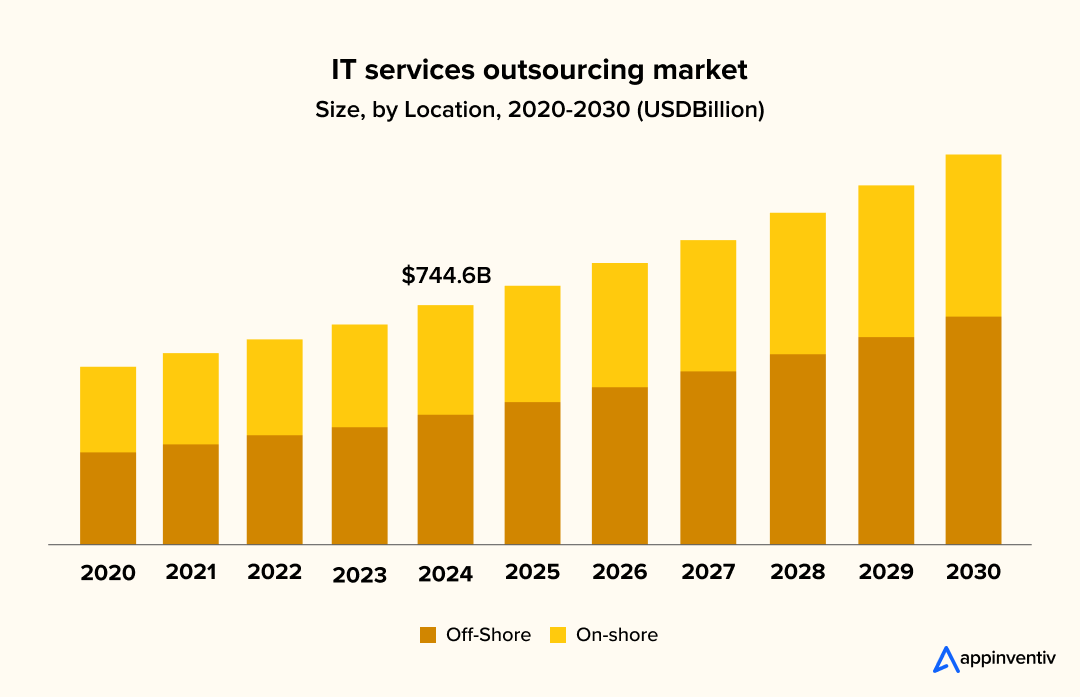
The increasing demand for specialized expertise in emerging fields, such as artificial intelligence, cloud computing, and big data analytics, is accelerating this trend, as offshore providers often possess in-depth knowledge in these technical areas. Additionally, businesses are increasingly using offshore partnerships to achieve greater operational flexibility and scalability, enabling rapid responses to market changes without major infrastructure investments.
While the story above illustrates the genuine advantages of offshore software development, a well-chosen partnership can provide access to global talent pools, significant cost reductions, and rapid scaling capabilities. The real challenge involves selecting a partner who can deliver both affordability and quality, without jeopardizing your project’s stability or causing unnecessary stress.
So, how can you sidestep the typical offshore development traps and make the smartest choice for your business?
This guide will walk you through proven outsourcing strategies, essential selection criteria, and methods for ensuring your offshore team becomes a genuine extension of your organization rather than a liability.
Start building offshore with confidence and clarity.
How Are Onshore, Nearshore, and Offshore Software Development Different From Each Other?
Onshore, nearshore, and offshore software development refer to the geographic location of the development team relative to the client’s company. Each model has its own set of advantages and challenges, making it essential to choose the right one based on your project needs, budget, and timeline. Here’s a comparison of the three models:
| Criteria | Onshore Development | Nearshore Development | Offshore Development |
|---|---|---|---|
| Location | Same country as the client. | Nearby countries, often similar time zones. | Distant countries, significant time zone differences. |
| Cost | Most expensive due to local labor rates. | More affordable than onshore, but pricier than offshore. | Least expensive due to lower labor costs. |
| Time Zone Alignment | No time zone difference, real-time collaboration. | Minor time zone difference, easier communication. | Major time zone difference, slower communication. |
| Cultural Alignment | High cultural and business alignment. | Similar cultural values and work ethics. | Significant cultural differences may affect collaboration. |
| Communication | Seamless communication with minimal delays. | Easy communication, but slightly more challenging than onshore. | Communication can be slower, requiring more management. |
Benefits of Offshore Software Development
Offshore software development has become a strategic approach for companies looking to stay competitive in a fast-paced digital landscape. Let’s see why it matters, analyzing the significant benefits it has to offer:
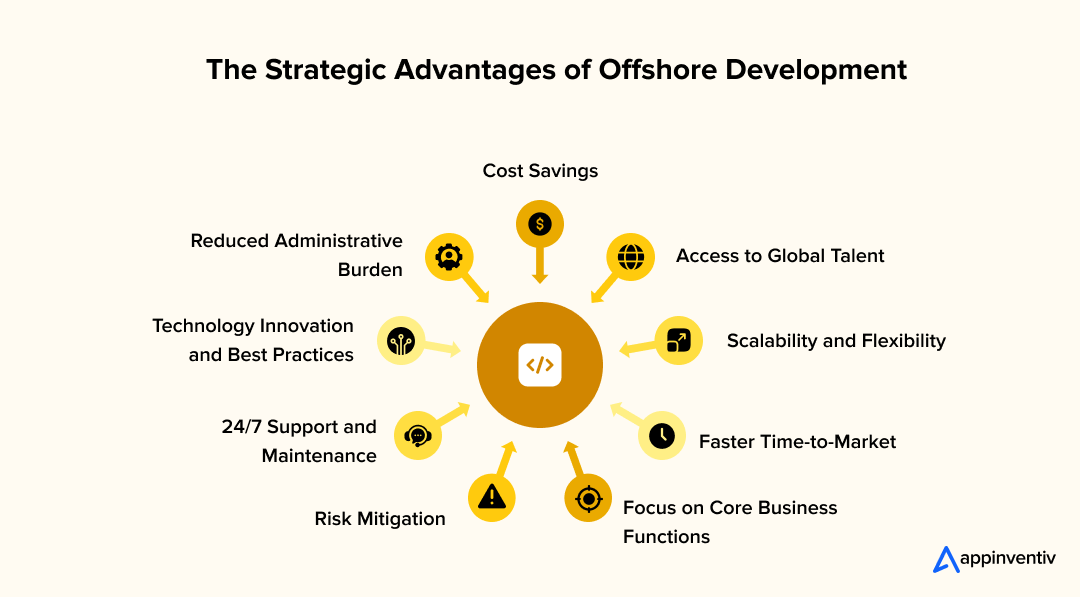
Cost Savings
Offshore software development outsourcing allows businesses to dramatically cut expenses associated with building and maintaining internal development teams. Companies gain access to skilled professionals in regions where wages are significantly lower, delivering the same quality software without the hefty price tags typically associated with domestic hiring.
This cost efficiency makes offshore outsourcing software development an attractive option for businesses looking to maximize their technology budgets. Beyond salary savings, offshore software product development eliminates overhead costs like office space, equipment, and employee benefits that can quickly add up with in-house teams.
Access to Global Talent
When companies choose offshore software product development, they unlock access to a worldwide pool of highly skilled developers. This global reach means businesses can find specialists with exactly the right expertise for their specific projects, often discovering talent that simply isn’t available in their local markets.
The ability to handpick from international talent pools ensures projects get the technical skills they truly need. Offshore software development outsourcing opens doors to developers who specialize in cutting-edge technologies and programming languages that might be rare in domestic markets..
Scalability and Flexibility
Offshore teams offer remarkable flexibility when it comes to scaling development efforts up or down based on project requirements. Whether a company needs a compact team for a quick project or a large workforce for extensive offshore software product development initiatives, offshore providers can adjust resources rapidly without the administrative burden of hiring and firing internal staff.
This scalability through offshore outsourcing software development means businesses can respond quickly to market demands without being locked into fixed staffing costs.
Faster Time-to-Market
One of the most compelling advantages of offshore software development outsourcing is the ability to leverage different time zones for continuous development. This “follow-the-sun” approach means work continues around the clock, significantly accelerating development timelines and helping businesses launch products faster than competitors who rely solely on traditional work schedules.
Offshore software product development teams can work while your local team sleeps, essentially doubling your productive hours each day. This continuous development cycle becomes particularly valuable for companies facing tight deadlines or trying to capitalize on emerging market opportunities before competitors can respond.
Focus on Core Business Functions
By partnering with offshore teams for software development, companies can redirect their internal resources toward essential business activities like marketing, sales, and customer relationships. This strategic approach to offshore outsourcing software development ensures that every aspect of the business receives proper attention while technical development proceeds smoothly in expert hands.
Internal teams can concentrate on activities that directly impact revenue generation and customer satisfaction rather than getting bogged down in complex technical challenges. This division of labor through offshore software product development allows companies to leverage their strengths while ensuring technical projects receive specialized attention from dedicated professionals.
Risk Mitigation
Offshore development inherently distributes risk across multiple geographic regions, safeguarding businesses against localized economic disruptions, talent shortages, regulatory shifts, or other region-specific challenges. This diversification helps ensure more consistent project progress and business continuity, regardless of what might be happening in any single location.
Offshore software development outsourcing provides a buffer against local market volatility and ensures projects can continue even if domestic conditions become challenging. Companies also benefit from reduced dependency on individual developers, as offshore providers typically maintain larger teams with overlapping skills to prevent project disruption if key personnel become unavailable.
24/7 Support and Maintenance
Many offshore software product development providers offer round-the-clock support and maintenance services, ensuring applications remain functional and secure at all times. This continuous monitoring and support capability means issues get resolved quickly, often before they impact end users.
Offshore teams can provide immediate response to critical problems while domestic teams are offline, maintaining system reliability and user satisfaction around the clock.
Technology Innovation and Best Practices
Offshore outsourcing software development teams often bring exposure to the latest technologies, frameworks, and industry best practices from their diverse client base. These teams stay current with emerging trends and can recommend innovative solutions that internal teams might not have encountered.
Working with multiple clients across different industries gives offshore developers unique insights into what works best for various types of projects and business requirements.
Reduced Administrative Burden
Companies utilizing offshore software development outsourcing eliminate much of the administrative overhead associated with managing large development teams. HR tasks, payroll management, benefits administration, and workspace requirements become the responsibility of the offshore provider.
This reduction in administrative tasks allows business leaders to focus on strategic decision-making rather than day-to-day personnel management, streamlining operations, and improving overall efficiency.
Who Should Hire Offshore Developers?
Offshore software development outsourcing has become a strategic move for various types of businesses. It’s particularly valuable for organizations wanting to tap into cost-effective solutions while keeping quality and expertise intact. Let’s look at who stands to gain the most from bringing offshore developers on board:
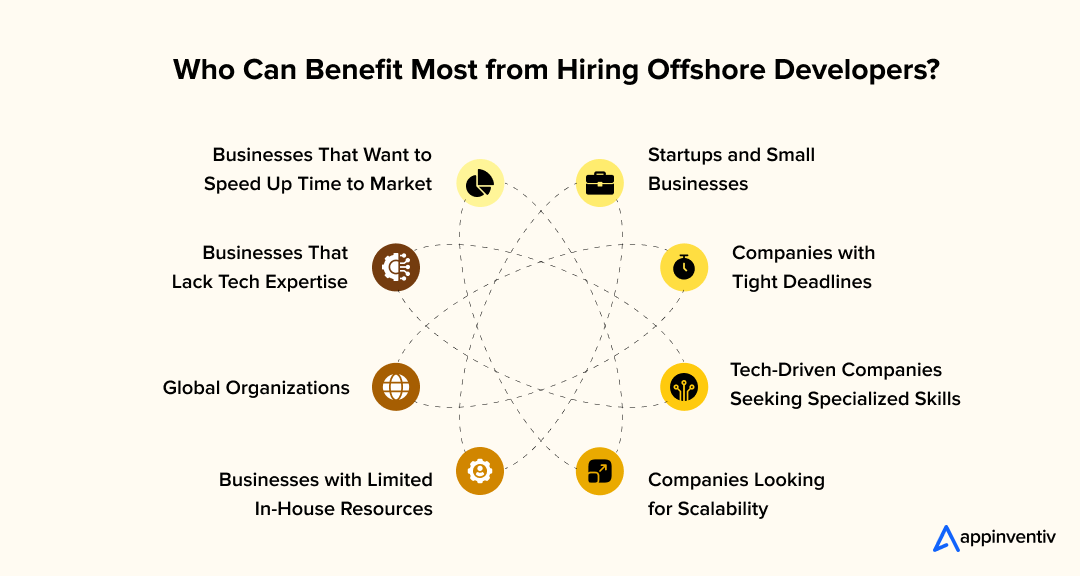
Startups and Small Businesses
Keeping development costs under control is everything for startups and small businesses. Offshore software product development gives them access to skilled talent without the financial burden of full-time in-house teams. This frees up their budget for other essential areas like marketing or business growth.
Companies with Tight Deadlines
When businesses need to get products to market fast, offshore teams become invaluable, particularly when they’re in different time zones. This creates a continuous work cycle where projects move forward around the clock, cutting down overall development time.
Tech-Driven Companies Seeking Specialized Skills
Sometimes companies need specific expertise that’s hard to find locally. Offshore outsourcing software development opens doors to global talent pools. Whether you need experts in AI, blockchain, or mobile development, offshore teams can provide those specialized skills your project demands.
Companies Looking for Scalability
Businesses that need to expand their development capacity for projects or ongoing support quickly find offshore teams incredibly useful. These partnerships offer the flexibility to adjust resources as needed, based on the requirements of each project, without the complications of local hiring.
Businesses with Limited In-House Resources
Not every company has the resources or capacity to build a complete internal development team. Offshore development serves as a practical solution, giving businesses access to seasoned developers without the need to recruit or train large teams internally.
Global Organizations
Companies operating across multiple countries or regions find offshore development particularly beneficial. It helps them address the unique needs of different markets while ensuring local teams work within their time zones, all while maintaining collaboration on worldwide projects.
Businesses That Lack Tech Expertise
It is not uncommon for founders with the best ideas to lack technical expertise. It helps businesses to partner with an offshore software development company that has the relevant technical skills to build the product. Through the model, you will be able to find and hire the best team.
Businesses That Want to Speed Up Time to Market
In the software domain, time trumps everything. If you take a lot of time in the software development stage, chances are your competitor will launch something similar, leaving your idea to waste. Choosing offshore developers means eliminating hiring and training time. You get the best team working on your project from day one.
Partner with the best offshore professionals to fill the technology gaps and drive your project forward seamlessly.
What Type of Services Can Be Outsourced?
When you outsource software development, you’re not just cutting costs—you’re tapping into talent from around the world, getting projects done faster, and scaling your business more efficiently. Whether you’re a startup building your first MVP or an enterprise overhauling legacy systems, there’s a whole spectrum of technical work that makes sense to outsource. Here’s what companies typically hand off to external teams:
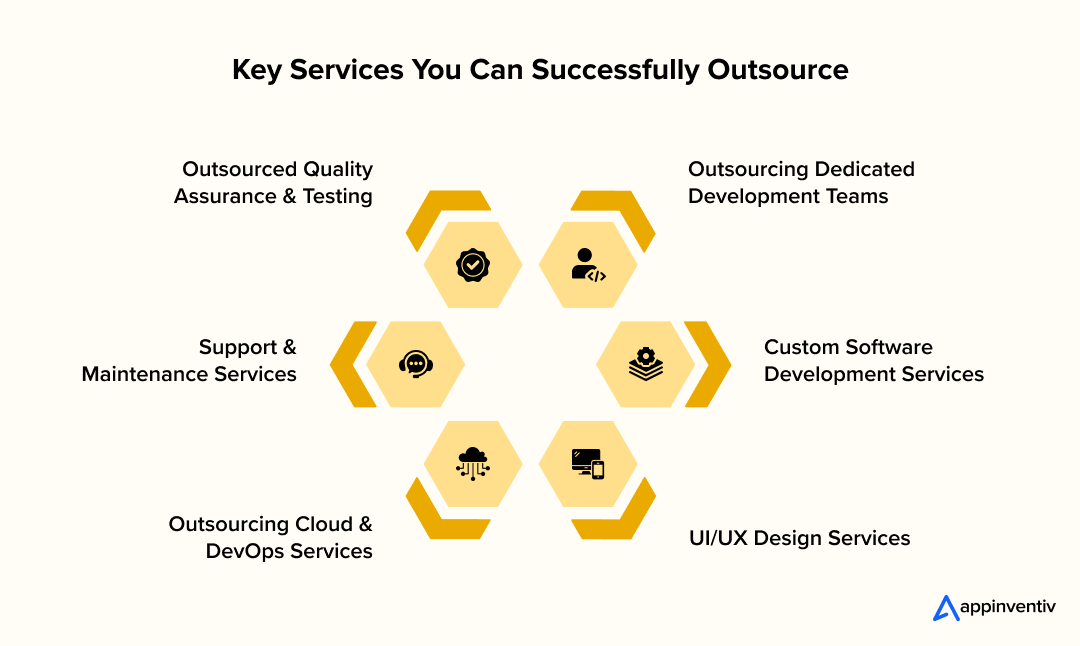
Outsourcing Dedicated Development Teams
Instead of hiring individual freelancers, you can hire an entire team of developers, QA engineers, designers, and project managers who can focus solely on your project. This approach lets you stay in control of the workflow and communication while skipping the headaches of recruiting and managing HR processes.
Custom Software Development Services
Working with offshore partners means getting software built specifically for your business needs, customer requirements, and operational workflows. Whether it’s enterprise applications or mobile apps that work across different platforms, custom development gives you flexibility and faster turnaround times while keeping costs reasonable and quality high.
UI/UX Design Services
When you outsource design work, you get access to experienced designers who know how to create interfaces that users actually want to use. They’ll deliver designs that look good and convert well, which frees up your internal team to focus on the bigger picture strategy instead of getting bogged down in wireframes and user journey mapping.
Outsourced Quality Assurance & Testing
Great-looking software still needs to work perfectly. Outsourced QA teams handle everything from hands-on testing to automated processes, making sure your software performs well, functions properly, and stays secure. This lets your development team concentrate on building new features while testing experts handle stability and compliance requirements.
Support & Maintenance Services
Once your software launches, it needs regular updates, bug fixes, and performance monitoring. Offshore support teams can provide round-the-clock coverage, ensuring everything runs smoothly with quick problem resolution and minimal downtime, especially important for business-critical systems and customer-facing applications.
Outsourcing Cloud & DevOps Services
Many businesses rely on offshore vendors for cloud infrastructure management and DevOps support. This includes setting up automated deployment pipelines, migrating to cloud platforms, monitoring infrastructure, and scaling environments, usually on AWS, Azure, or Google Cloud. These services help you build a more flexible and reliable backend infrastructure.
How to Hire the Best Offshore Software Developers?
The benefits and the types of companies that are most likely to be on the receiving end, which we covered just now, can only be achieved when you hire the best offshore developers. One wrong move there, and you might end up increasing the deadline and spending a lot more than the stipulated amount.
Here are some things you should take into consideration when hiring overseas startup developers.
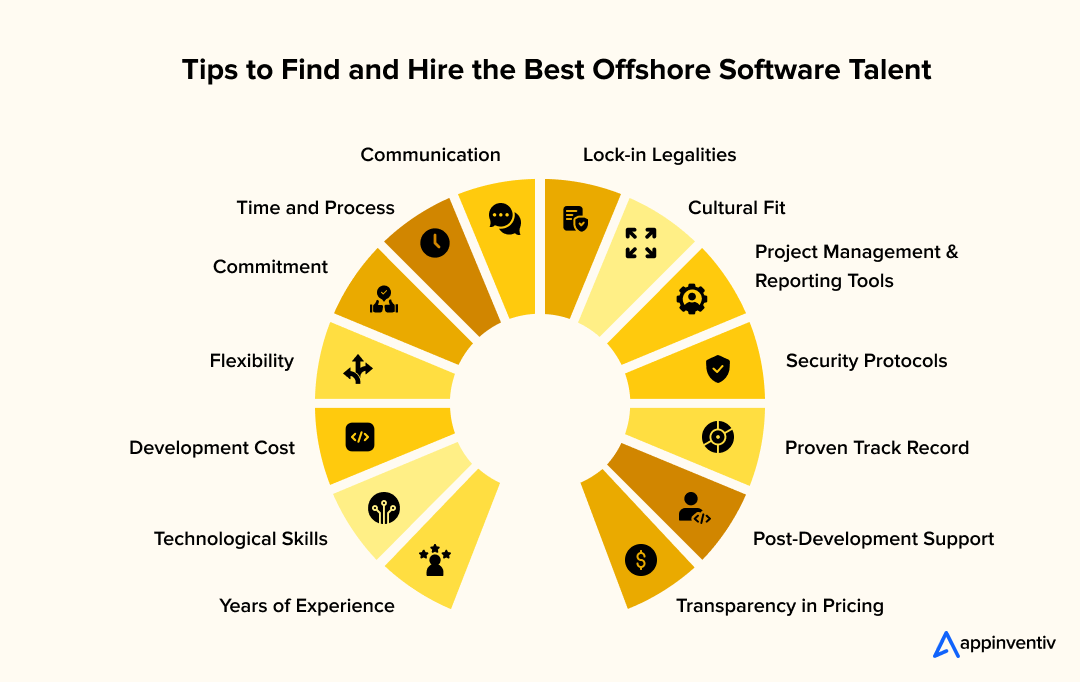
1. Years of Experience
There is no doubt that validating the experience of an offshore software development company is necessary. When you are in the market, consider the quality of the software design, project architecture, and code. This validation can be achieved through careful consideration of previous work and client reviews.
2. Technological Skills
Note the technology areas in which the offshore custom software development company excels. While it is acceptable to work with a generalist firm that has expertise in multiple technologies, we recommend partnering with someone who specializes in a specific technology. This way, you will get dedicated support from the team.
3. Development Cost
It is crucial to find a software development outsourcing company that quotes an appropriate amount of money. While you could get attracted to hiring the best developers in the market, the price might not meet your budget. On the other hand, hiring a team that asks for a very low price quote also seems like a lucrative offer, but that could cost you quality.
The ideal situation would be to hire a team that quotes an appropriate cost structure. Wondering what it would be? Here’s our software development cost guide, which can help.
4. Flexibility
You should partner with an outsourcing software development company that offers flexibility in terms of time allocation and team size. Our advice here would be to start on a sprint and deliverable model instead of sending a contract for months of work. When you work on a project-based relationship, there is no pressure to have a long-term relationship, and you can move up the requirements as the project moves.
Also Read: Software Development Outsourcing Tips From 15 Industry Experts
5. Commitment
Do you know what feels good to hear when you are out looking for a software development outsourcing partner? Yes. However, firms that simply agree to every requirement of yours are, in effect, red flags.
What you should look for is an outsourcing software development team that asks questions, challenges your idea, and makes you think in another direction.
6. Time and Process
Building software can be a complex process. But the fact is, you need that software to become a market leader, and for that, you would have to know the timeline of your offshore software development project
Likewise, you would need a team that has a process in place to get you there in record time without compromising on the quality.
7. Communication
When it comes to communication in offshore custom software development, two key aspects stand out: fluency and timing. The development team must communicate project updates clearly and effectively, ensuring there’s no room for misinterpretation. Equally important is their availability—they should align with your working hours or be accessible when your in-house team is active.
8. Lock-in Legalities
The last element that we advise founders to look into is the lock-in legalities before hiring offshore development services.
First, you should ensure that the IP rights remain yours. This way, if you ever decide to take your project to some other company, you will be able to. Second, look at the code lock-in terms. Ideally, the code should get transferred to you once it has been developed.
9. Cultural Fit
Cultural alignment can make or break your offshore partnership. The best offshore software development outsourcing happens when teams actually understand each other’s work styles and values.
Take time to interview potential teams. Ask about their communication style, deadline approach, and experience with similar companies. You’re not looking for clones of your team, but people who can adapt to your business culture.
10. Project Management and Reporting Tools
Solid project management systems are non-negotiable, especially across different time zones. Many projects fail because teams assume communication will just work itself out.
Confirm your offshore team uses familiar tools like Jira, Asana, or Trello. More importantly, establish clear reporting schedules from day one. Weekly updates, milestone reviews, and status calls keep everyone aligned.
11. Security Protocols
Security can’t be an afterthought when sharing sensitive data with offshore teams. The offshore software development benefits are significant, but protecting your intellectual property is paramount.
Ask detailed questions about their security measures. How do they handle data encryption and secure transfers? Are they compliant with GDPR or ISO 27001? Don’t just take their word – request documentation and proof of certifications.
12. Proven Track Record
Experience trumps promises every time. The best offshore software product development teams can show you exactly what they’ve delivered for other clients.
Look for teams with relevant project experience in your industry or technology stack. Don’t just browse their portfolio, ask for case studies, client testimonials, and specific examples of challenges they’ve overcome. Strong references validate their claims.
13. Post-Development Support
Development is just the beginning. Long-term success depends on reliable post-launch support for bug fixes, updates, and maintenance.
Discuss support terms before signing contracts. What’s included in their standard package? How quickly do they respond to critical issues? Clear service-level agreements prevent future headaches and ensure continued product quality.
14. Transparency in Pricing
Nobody wants surprise costs halfway through a project. The best offshore partners provide complete pricing transparency from the start.
Request detailed breakdowns covering development hours, project management, testing, and additional services. If something seems unclear, ask questions. Reputable teams gladly explain their pricing structure and help you understand your investment.
What are the Cost Components of Hiring the Best Offshore Software Development Team?
When hiring an offshore software development team, various cost elements come into play. Understanding these components is essential for accurate budgeting and avoiding hidden expenses. Below is a breakdown of the major cost factors involved in the process:
| Cost Component | Description | Estimated Cost Range |
|---|---|---|
| Training and Hiring | Costs associated with recruiting and onboarding new team members, including recruitment agency fees and training expenses. | $5,000 – $15,000 per hire |
| Development | This covers the actual development work including coding, design, and feature implementation. Costs are usually based on the developers’ hourly rate or project-based pricing. | $30 – $100 per hour (varies by region and developer expertise) |
| Project Management | The cost of a project manager overseeing the development process, ensuring milestones are met and communication between teams is seamless. | $5,000 – $20,000 per project |
| Quality Assurance (QA) | QA testing to ensure the product is free of bugs and meets functional and security standards. This may include manual and automated testing. | $10,000 – $30,000 per project |
| Auxiliary Costs | Additional costs that may include documentation, design, or specialized tools required for the project. | $3,000 – $10,000 |
| Service Costs | Ongoing maintenance, updates, and troubleshooting after the software has been deployed. | $2,000 – $10,000 per year |
| Infrastructure Costs | The cost of tools, platforms, and servers that are needed to develop, test, and deploy the software. This may include cloud service charges or hardware procurement. | $5,000 – $25,000 per project |
By breaking down these components, businesses can gain a clearer understanding of the financial commitment involved in hiring offshore developers and plan their budgets accordingly. While some costs are one-time (such as recruitment and training), others, like infrastructure and service costs, will be ongoing.
Challenges of Offshore Software Development and Solutions to Overcome Them
Offshore software development brings significant benefits, but it also presents unique obstacles that businesses need to navigate carefully. Here are the most common challenges companies encounter when working with offshore development teams, along with practical strategies to address them effectively:
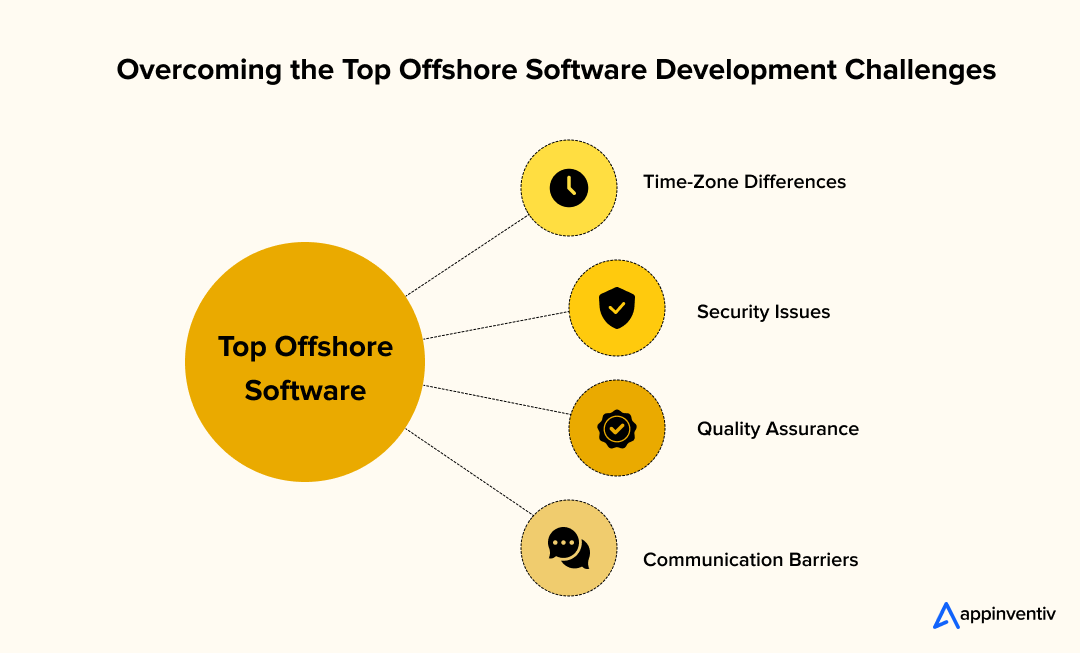
Time-Zone Differences
Challenge: Time-zone misalignment ranks among the biggest hurdles in offshore development partnerships. When your team operates during standard business hours while your offshore developers work halfway around the world, coordinating meetings and getting quick responses becomes genuinely difficult. This disconnect can slow down decision-making processes and create frustrating delays when urgent issues need immediate attention.
Solution: Smart offshore partnerships tackle this challenge by establishing overlapping work hours and scheduling regular touchpoints that work for both teams. Successful companies adjust their availability to match critical business hours, ensuring that important conversations happen in real-time. This approach maintains project momentum while respecting everyone’s work-life balance and creates predictable communication windows.
Security Issues
Challenge: Handing over sensitive business data and proprietary code to an external team naturally raises security challenges in offshore software development. Without proper safeguards, there’s a genuine risk that confidential information could be compromised or intellectual property might be misused.
Solution: Reputable offshore development companies implement comprehensive security protocols from day one. Establishing robust non-disclosure agreements and intellectual property protection measures before any work begins is essential. Maintaining strict cybersecurity standards, including secure development environments and regular security audits, protects sensitive information throughout the entire project lifecycle.
Quality Assurance
Challenge: Maintaining consistent quality standards becomes more complex when working with remote teams. Different development practices, varying quality control processes, and limited direct oversight can result in deliverables that don’t meet your expectations. Without proper quality checkpoints, small issues can compound into major problems.
Solution: Effective offshore partnerships integrate quality assurance into every stage of development rather than treating it as an afterthought. Regular code reviews and transparent quality protocols that clients can monitor in real-time are crucial. Project managers should provide consistent updates and create clear feedback loops, ensuring quality issues get addressed immediately rather than during final delivery.
Communication Barriers
Challenge: Clear communication becomes critical when teams are separated by distance, and language differences or varying communication styles can create serious misunderstandings. These communication gaps often lead to incorrect implementations, missed requirements, and project delays that could have been easily avoided.
Solution: Successful offshore partnerships prioritize communication clarity from the start. Working with developers who are fluent in your preferred language and using collaborative project management tools that keep everyone aligned is essential. Regular video calls, detailed documentation, and real-time task tracking ensure that nothing gets lost in translation.
When to Outsource Software Development?
You can hire software development outsourcing at any stage of the development process.
- When you are brainstorming the idea – If you have a fair idea of what the app will be about but don’t know the technicalities, it’ll be good to partner with software consultants. Software development consulting benefits businesses in all kinds of ways. Ensure that you have a dedicated and reliable team for idea and product consultation
- When the project reaches the development stage – Once you have the idea and the structure of the app ready, now would be the time to connect with the software development agency in Melbourne and initiate the journey.
- When the software is developed – Even after the software has been released, there might be a chance that you need maintenance support. You can partner with the firm to help with software updation or maintenance.
How to Manage Your Offshore Developers?
Managing an in-house team of developers is difficult. Imagine how complex it can get to manage a team of offshore developers! In fact, reasons around team management majorly make up the list of top offshore software development challenges.
However, all the challenges can be eliminated with proper team management. Let us give you some tips on that.
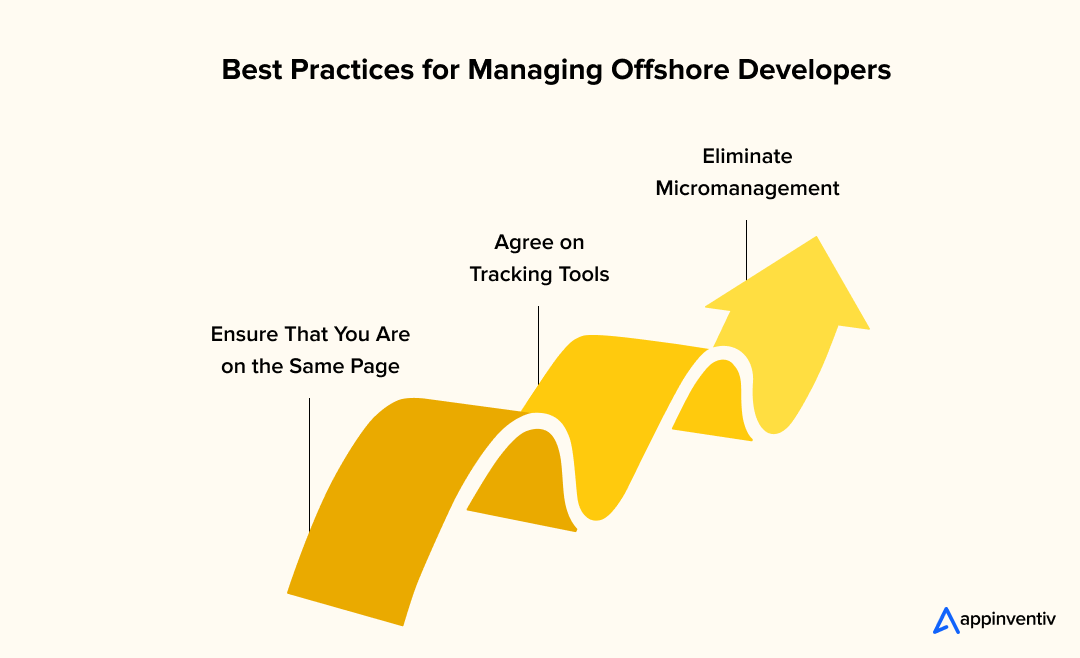
Ensure That You Are on the Same Page
It won’t be new to get lost in translation or miss out on important things because you misassumed something. Before the offshore software outsourcing project begins, spend some time with the team to align your vision with their capabilities and processes.
Agree on Tracking Tools
The offshore development team you are going to partner with won’t be in-house. This makes it all the more important to agree on tracking tools where you would be able to be on top of the tasks done and the time that went into them.
Eliminate Micromanagement
You should always note that the team is not your in-house team of employees. Meaning, you will have limited control over them. In that capacity, it is helpful to get in touch with the team only when necessary or when you require an update.
So here is everything you need to know about hiring offshore software developers. Ultimately, it is a great approach for lowering delivery time and cost. The model works great for startups and for established firms without a technical team.
However, it can be difficult to find the right partners who understand your vision, work in your timezone, and are aligned with your team’s culture. We hope that this guide helps you find the right team to offshore your software project to.
Let us handle the complexity while you focus on growth.
Offshore Software Development Trends: What to Expect in 2025 and Beyond
Offshore software development has experienced significant growth over the past few years, driven by technological advancements, evolving business needs, and shifting global market conditions. Here are the key trends transforming the offshore software development landscape in 2025 and beyond, positioning businesses to maintain their competitive edge.
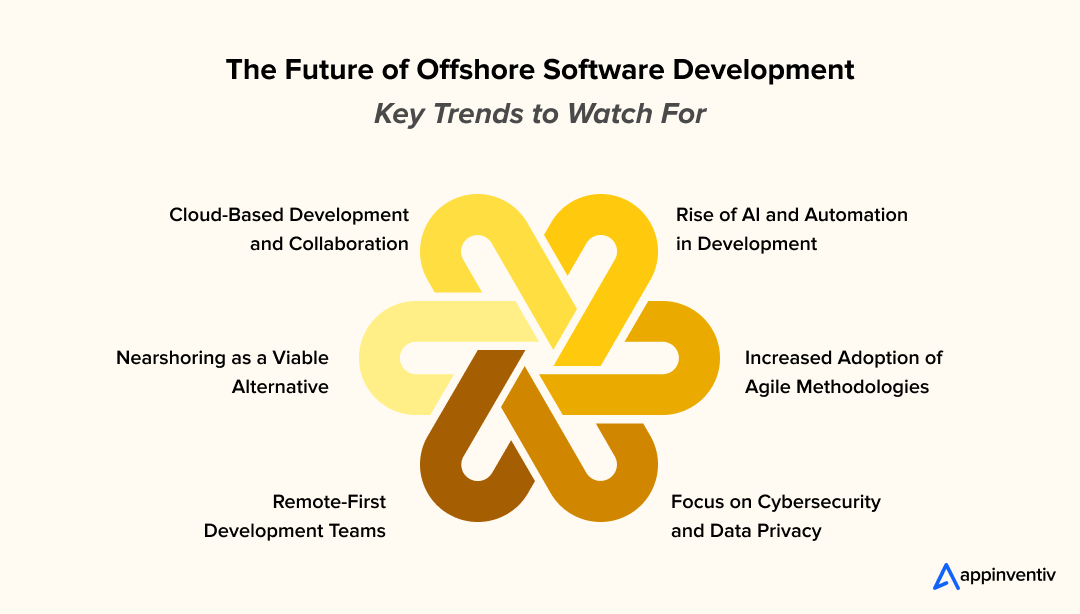
Rise of AI and Automation in Development
Artificial intelligence and automation technologies are revolutionizing how offshore teams approach software development. These advanced tools now handle code generation, automated testing, and bug detection with impressive efficiency, dramatically cutting development timelines while boosting accuracy.
Offshore software development outsourcing providers are leveraging AI to deliver faster results without compromising quality, giving their clients significant advantages in time-to-market.
Increased Adoption of Agile Methodologies
Agile development practices have become standard among leading offshore teams, transforming how projects get executed. This methodology enables greater flexibility, quicker iteration cycles, and enhanced client collaboration throughout the development process.
Teams can adjust requirements on the fly, respond to feedback immediately, and maintain stronger alignment with business objectives, resulting in software that truly meets client expectations.
Focus on Cybersecurity and Data Privacy
Rising cyber threats and data breaches have pushed security to the forefront of offshore software product development priorities. Companies are implementing comprehensive security frameworks and ensuring compliance with international standards like HIPAA and GDPR.
This heightened focus on data protection has become a critical differentiator for offshore providers, as clients demand ironclad security guarantees before sharing sensitive business information.
Remote-First Development Teams
The pandemic fundamentally changed how development teams operate, with many offshore companies now embracing remote-first models permanently. This approach allows businesses to access exceptional talent regardless of geographic location, expanding the available expertise pool exponentially.
Remote-first structures also reduce overhead costs while maintaining productivity levels that often exceed traditional office-based arrangements.
Nearshoring as a Viable Alternative
While traditional offshore development remains popular, nearshoring is gaining momentum as companies seek closer collaboration opportunities. Working with teams in nearby time zones facilitates real-time communication, reduces scheduling conflicts, and enables more responsive project management. This trend reflects the growing importance of seamless collaboration in complex software projects that require frequent stakeholder input.
Cloud-Based Development and Collaboration
Cloud technologies have transformed how offshore software outsourcing teams collaborate across distances. Modern project management platforms, version control systems, and communication tools create seamless workflows that connect distributed teams effectively.
These cloud-based solutions eliminate traditional barriers to remote collaboration, enabling offshore teams to function as integrated extensions of their clients’ internal development capabilities.
At Appinventiv, we implemented a secure and scalable cloud infrastructure for AVATUS to support its dynamic digital avatar platform. To safeguard user data and maintain service integrity, we deployed a private cloud network.

We also leveraged Spot.io for intelligent cost optimization and automated resource scaling, ensuring efficient performance even during usage spikes. Continuous monitoring and fine-tuned resource allocation further improved operational efficiency. As a result, AVATUS achieved a secure, high-performing, and cost-effective platform with maximized ROI.
How Can Appinventiv Help With Offshore Software Development?
Offshore software development has evolved from a basic cost-saving tactic into a strategic growth enabler for businesses aiming to innovate, scale, and lead in today’s accelerated, technology-first market landscape.
As technology continues to advance rapidly, the demand for flexible, scalable, and efficient software solutions also grows. Companies are increasingly looking to tap into worldwide talent networks, and offshore development offers unique benefits by providing access to specialized expertise while maintaining budget efficiency and operational agility.
As an established offshore software development company, we’ve collaborated with global brands and innovative startups, including AVATUS, IKEA, KFC, Ility, DiabeticU, and JobGet, to build cutting-edge digital platforms that elevate customer engagement and fuel business growth. Trusted as a global, ISO-certified technology partner, Appinventiv brings over 10 years of experience, a team of 1600+ developers, and a proven track record with brands. With deep expertise in AI, IoT, Blockchain, AR/VR, Metaverse, and Business Intelligence, we deliver cutting-edge solutions across industries. Our excellence has been acknowledged by the Times Business Awards, Deloitte, CIO Klub, and Clutch Global 2024, recognitions featured in our media coverage.
Our methodology extends beyond conventional offshore development practices. We emphasize partnership, creativity, and openness, making sure every project becomes a genuine collaborative effort rather than just a vendor relationship.
Over the years, we’ve partnered with businesses across the globe, delivering custom offshore software development services that solve real-world challenges. Our diverse experience spans multiple industries, allowing us to bring domain-specific insight, technical excellence, and scalable solutions to each project.
Healthcare: We’ve helped healthcare providers modernize care delivery with solutions ranging from remote patient monitoring (RPM) to mental health support, improving accessibility, compliance, and patient outcomes.
Logistics: Our team has built transportation management systems and warehouse automation platforms that streamline route planning, inventory control, and order fulfillment for logistics and dropshipping businesses.
Social Media: We’ve developed interactive platforms and mobile applications tailored for niche social communities, enhancing user engagement and real-time collaboration across devices.
FinTech: We’ve supported financial institutions and SaaS providers with tools for eCommerce management, retail operations, and secure financial transactions, ensuring performance, compliance, and scalability.
Insurance: From policy management portals to end-to-end digital ecosystems, we’ve delivered software that helps insurance providers offer streamlined and user-friendly services to their customers.
Whether you’re planning to introduce a new product, enhance your current software systems, or expand operations internationally, Appinventiv’s skilled developers seamlessly integrate with your existing teams, bringing your concepts to life with efficiency, accuracy, and adaptability.
As offshore development continues to reshape the technology sector, we stand ready to help you maintain your competitive edge, transforming your ideas into meaningful, innovative solutions that fuel business achievement.
Get in touch today!
FAQs
Q. Why choose offshore software development?
A. There are a number of benefits that come attached with offshore development. It ranges from direct access to best-in-class developers and lower development risks to reduced operational and development costs, faster project delivery, higher scalability, and access to latest technologies.
Q. How to choose the right offshore software development company?
A. Choosing the right offshore software development company is key to the success of your project. Here are some essential factors to consider:
- Expertise and Experience: Look for a company with proven skills in the technologies and industries relevant to your project. Check their portfolio and past work.
- Communication: Ensure clear communication channels are in place, with effective coordination across time zones and language proficiency.
- Development Methodology: Choose a software development agency that uses agile or flexible development practices to meet evolving project needs.
- Security: Verify the company’s security protocols, including NDAs and IP protection, to safeguard your data and ideas.
- Cost Transparency: Ensure the pricing structure is clear and fits within your budget without hidden costs.
Q. What are the pros & cons of offshore software engineering?
A. Offshore software engineering has become increasingly popular, but it’s not without trade-offs. Here’s what you need to know:
Pros:
- Cost Savings: You can cut development costs significantly by working with teams in regions where skilled developers charge less than local rates.
- Global Talent Access: Get access to specialized skills and expertise that might be hard to find or expensive in your local market.
- Round-the-Clock Development: Different time zones mean work continues while your team sleeps, potentially speeding up project delivery.
- Easy Scaling: Add or reduce team members quickly based on project needs without the hassle of hiring and firing local staff.
Cons:
- Time Zone Headaches: Coordinating meetings and getting quick answers becomes challenging when teams are half a world away.
- Communication Gaps: Language barriers and different work cultures can lead to misunderstandings and project delays.
- Quality Concerns: Maintaining consistent standards across different teams and locations requires careful oversight and management.
- Security Risks: Sharing sensitive business data with external teams introduces potential privacy and security vulnerabilities.
Q. What is the cost to hire an offshore development team?
A. The cost to hire an offshore development team depends on factors like location, expertise, and project complexity. On average, hourly rates range from $20–$50 in regions like India and Southeast Asia, $30–$60 in Latin America, and $60–$120 in Western Europe.
For project-based pricing, small projects can cost between $10,000–$50,000, while medium and large projects range from $50,000 to $150,000+ depending on the scope and team size. Quality and timeline considerations are key for pricing decisions.


- In just 2 mins you will get a response
- Your idea is 100% protected by our Non Disclosure Agreement.

Custom Development or White Label Solutions: Which is Right for Your Business?
Key takeaways: 77% of companies are prioritizing digital transformation; the right tech approach is crucial for staying competitive. Custom development offers tailored solutions for unique needs, flexibility, and long-term scalability. Whereas, white-label solutions provide quick market entry, cost-efficiency, and easy customization for standard needs. Appinventiv’s expertise helps you navigate custom development vs white-label to choose…

ERP Integration in Australia - Why It Is Essential and How to Do It Right
Key takeaways: ERP integration enables operational efficiency, reduced costs, and enhanced decision-making. Healthcare, finance, manufacturing, retail, and all the other sectors are benefiting from ERP integrations in Australia. While ERP integration can be costly, ranging from AUD 45,000 - AUD 450,000, it leads to significant long-term savings and scalability. Compliance with Australian regulations is critical,…

Predictive Analytics Software Development - Features, Benefits, Use Cases, Process, and Cost
Key Takeaways Predictive analytics helps businesses shift from “what has happened” to "what will happen," enabling proactive strategies rather than reactive ones. Real-time analytics and AI integration are driving the growth of predictive analytics, making it more accurate, accessible, and critical for business success. Custom predictive analytics solutions can enhance customer satisfaction, reduce costs, and…


















